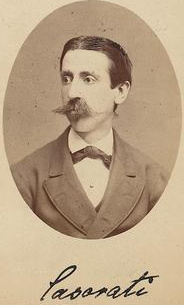| Felice Casorati | |
|---|---|
 Felice Casorati Felice Casorati | |
| Born | (1835-12-17)17 December 1835 Pavia, Lombardy–Venetia |
| Died | 11 September 1890(1890-09-11) (aged 54) Casteggio, Italy |
| Nationality | Italian |
| Alma mater | University of Pavia |
| Scientific career | |
| Fields | Mathematician |
| Doctoral advisor | Francesco Brioschi |
Felice Casorati (17 December 1835 – 11 September 1890) was an Italian mathematician who studied at the University of Pavia. He was born in Pavia and died in Casteggio.
He is best known for the Casorati–Weierstrass theorem in complex analysis. The theorem, named for Casorati and Karl Theodor Wilhelm Weierstrass, describes the remarkable behaviour of holomorphic functions near essential singularities, which is that every holomorphic function gets values from any complex neighbourhood, in any neighbourhood of the singularity.
The Casorati matrix is useful in the study of linear difference equations, just as the Wronskian is useful with linear differential equations. It is calculated based on n functions of the single input variable.
Works
- Casorati, Felice (1868), Teorica delle funzioni di variabili complesse (in Italian), Pavia: Tipografia dei Fratelli Fusi, pp. XXX+471, JFM 01.0128.05, available at Gallica (also at GDZ). Freely available copies of volume 1 of his best-known monograph, the only one ever published.
- Le proprietà cardinali degli strumenti ottici anche non centrati (in Italian). Milano: Bernardoni. 1872.
External links
 Media related to Felice Casorati (mathematician) at Wikimedia Commons
Media related to Felice Casorati (mathematician) at Wikimedia Commons- O'Connor, John J.; Robertson, Edmund F. (August 2006), "Felice Casorati", MacTutor History of Mathematics Archive, University of St Andrews
This article about an Italian mathematician is a stub. You can help Misplaced Pages by expanding it. |
